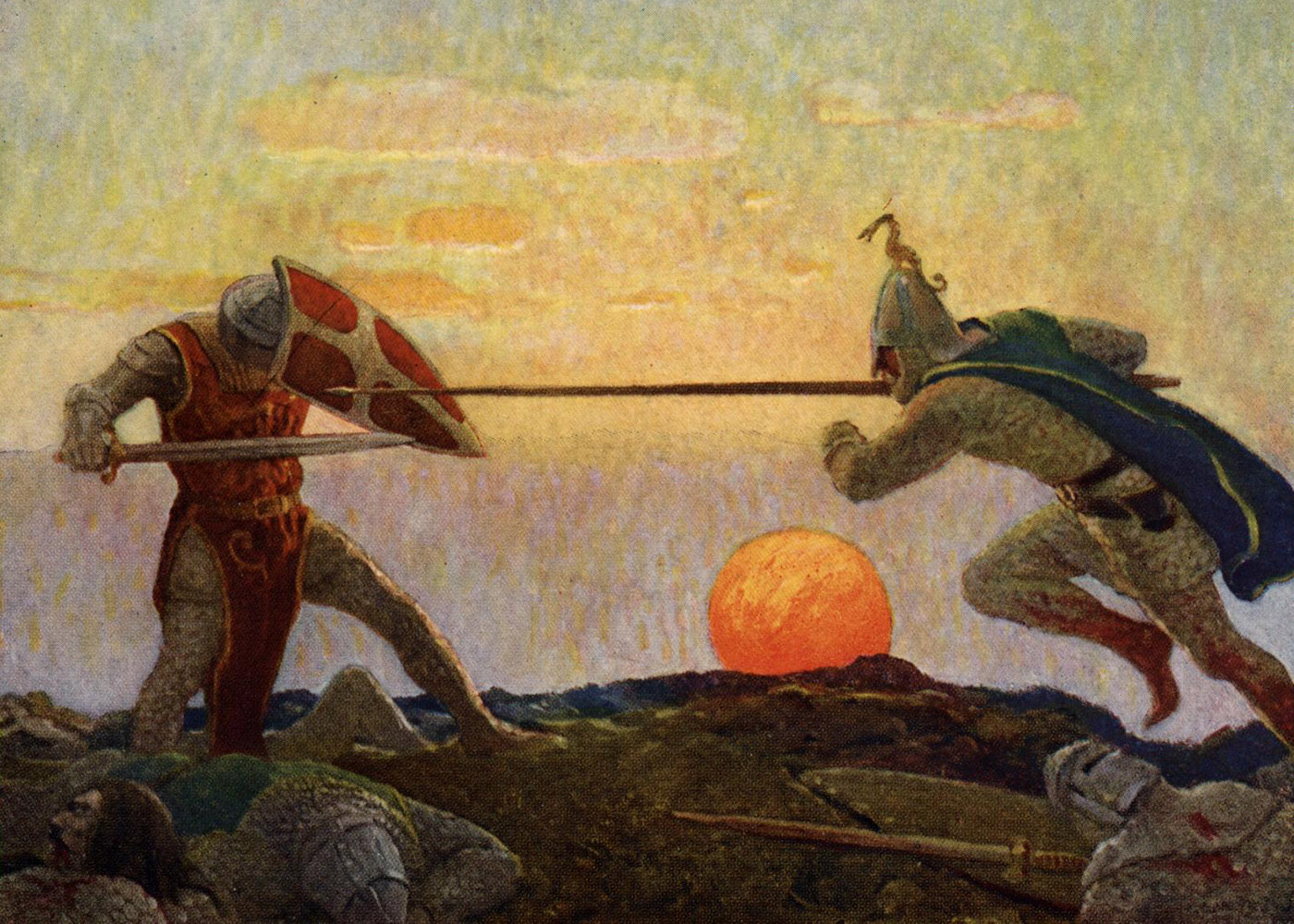I recently finished re-reading T. H. White’s The Once and Future King for the first time in 10 years. I am big into Arthurian legend and need little excuse to read any author’s telling. Of all the Arthurian books I have read, this one ranks high in my estimation.
White’s contribution to the Merlin character is beyond value. His actions and motivations never made enough sense in Malory’s Le Morte d’Arthur, nor many of its derivations. What is the source of Merlin’s perfect (and eerily detailed) foresight? Why did this foresight fail him in regards to Nimue’s treachery? Why did he go willingly to his doom? It is White’s genius that he solves these conundrums so efficiently by explaining that Merlin is living his life backwards through time—that he was born at the world’s ending and is doomed to live to its beginning. His foresight requires no magical powers: he knows the future because he has already lived it. This, too, solves the problem of Nimue and his imprisonment in the tree: he does not seek to avoid it because to him it has already happened.
I could write extensively about all the things I admire in this telling, but I would much prefer to skip straight to the argument that is White’s foundation here, and that is on the topic of Might is Right. The Once and Future King is first and foremost a meditation on this topic. White takes extensive liberties with Malory’s blueprint; all characters and stories have been rewritten with this topic in mind.
That might is right was on White’s mind is not surprising given the World War II-era time in which most of this novel was written. Nor, too, is it surprising where White’s opinion falls: how could an Englishman during that time possibly agree with that statement? He populates pre-Arthur Britain with dastardly rogue knights, plaguing the country with their misdeeds and wanton murders. He explains that these knights adhere to the tenets of might is right, using their armor, weapons, castles, and superior skill as trained warriors to their own advantage rather than in the interests of those who lack their strength. After Arthur unites his fractious country, it is his first task to deal with these knights.
White is not alone in his rejection of might is right: it is the ever-growing opinion of our time. We have a long way to go before we live in a world without war, but this is easily the most peaceful age that humanity has ever enjoyed, and it looks to be part of a trend toward even greater peace. The real conquests of the 21st first century are not fought on the battlefield—they’re fought in the boardrooms of Fortune 500 companies. Lawyers, politicians, and businessmen are the iron-clad warriors of the modern age. People need not die for interests to be advanced.
Is might right? Progressive-minded people wouldn’t hesitate to give you a ‘no’. It’s a question they can’t remember having grappled with and wouldn’t consider putting any additional thought into. That I will proceed to thoughtfully consider it perhaps pushes me beyond progressivism into radicalism.
To say that might is not right rings hollow when one considers the individual vs. nature. All of existence is a struggle. Each human life is an act of might. Our immune systems fight all manner of pathogens that would see us dead in the ground. That we wake to see another day is a credit to our strength: we live because we are strong enough to do so, and depart this world when we are not.
Lesser life forms are our fuel, from animals to vegetables to plants. We eat the apples—not the other way around—because we are superior life forms. Apples provide sustenance that we need; in the interest of self-preservation, we consume them. If our digestive systems required us to eat grass, we would eat grass. There is little choice in the matter—this is the species we are. We did not choose this earthly form (according to most). We do what we must to live, for living is right. By our strength, we do so as long as possible.
I would also contend that an individual’s strength belongs to the individual. I speak strictly in terms of possession; what he does or does not owe to society is a moral question I will not tackle. His strength is his own and is not subservient to the collective. Notwithstanding any prior obligations, it is his right to utilize his strength in his own interests and not another’s.
Is might right? It may be the only right there is. It’s foundational. It’s the basis of life. It’s the very impetus that propelled us forth from single-celled organisms to the species we are today. The strong survived—the strong evolved—the strong climbed atop the food chain. To deny that might is right is to deny our very position on this earth.
But as with all things in an increasingly complex human society, we move farther and farther from the principles of nature. For the orderly functioning of society, might is not right. An unauthorized use of might may see you quickly removed and barred from the rest of us. This is not wrong. Our successes as a species—our incredible numbers—our technological innovations, which have empowered even the meekest of individuals to heights never before achieved—these developments require the sacrifice of some individual rights.
This was not so when the world was a simpler place. Think of a Neanderthal who was unable to share the limited resources in his environment. Was it wrong of him to kill a recently migrated neighbor so his family could eat? He was stronger—he and his family ranked in importance—so he crushed his neighbor’s skull with a rock. Could you begrudge him that when his survival was at stake? In the absence of a prison, would you have thrown him off a cliff? I’d call that unfair.
The question of want vs. need is central to the evolution of opinion regarding might. Time was, “want” was an inconceivable notion. It was all a prehistoric human could do to scratch a living from the earth. It was all-hands-on-deck. You broke your back from morning to night, because if you didn’t, you weren’t going to survive for long.
We’ve forged a very different world today. In developed countries, few people are starving. Few people go without roofs over their heads if they truly want them. An individual’s needs are largely, overwhelmingly met.
I do not question White’s logic, which reasonable people would find to be sound. However, I will contend that he phrased his argument incorrectly. He is not unconditionally against might, but rather against the use of might in the attainment of wants. His rogue knights have more than enough without terrorizing the countryside. A person can’t kill his neighbor because he wants his possessions. Might is only excessive (and perhaps even criminal) as long as survival is not at issue—hence the modern trend of opinion against it. Those of us in the developed world already take it for granted that survival once had to be fought for, and the developing world will continue to catch up with every passing year.
Life will fight to live in spite of it all, but this is not true of humans. It is not enough to simply live; life must be worth living. Base survival is not enough for everyone. It is one of the few traits that separate us from the other animals. That “worth” is entirely subjective is the true crux of White’s might is right dilemma and why it is a drama that is destined to play out forever. The problem for his characters—and for all of us in this modern age—is differentiating wants from needs. A person can wholly convince himself that life is only worth living if he attains such-and-such. It doesn’t matter if such-and-such is clearly a want; he has assigned it a value worth living and dying over.
I don’t have any simple answers, though I would recommend an emphasis on non-theistic moral teachings to fill the cracks left by our crumbling (and in my opinion, outdated) religious institutions. Still, sound morals is bound to be a partial solution at best. I can only hope, in conclusion, that the modern rejection of might that T. H. White espouses is not viewed as narrowly as I fear it may be. Might is right, though restraint and control is certainly called for in today’s world.


